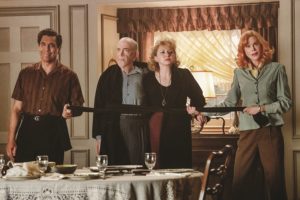As a filmmaker, Paul Thomas Anderson has been compared to Orson Welles, and there’s a grain of truth to that hyperbole: both are fiercely creative and indulgent. Anderson, who exploded onto the art-film scene with the porn-world epic Boogie Nights in 1997, grew up in the San Fernando Valley and the shadow of Hollywood (his father was the voice actor Ernie Anderson). He has never looked back at his origins with more charm than in his latest feature, Licorice Pizza, which is playing only in theaters.

It’s a coming-of-age tale, set in the Valley in the ’70s, about a smooth-talking, can-do 15-year-old named Gary Valentine, and the object of his affections, a 25-year-old restless soul named Alana. Gary is winningly played by stocky Cooper Hoffman, the 18-year-old son of the late Philip Seymour Hoffman, Anderson’s close friend and collaborator. Portraying Alana is the pop-rock musician Alana Haim of the band Haim, which is led by her two older sisters, and, adding another intimate touch, the Haim sisters and their actual parents play Alana’s fictional family in Licorice Pizza. The movie is an acerbic love letter to the free-spirited hustle that was the Valley of that era. Indeed, Anderson has said that the movie’s title is a reference to a SoCal record-store chain that existed then, but it’s poetically apt, nonetheless.
In the film, teenage Gary manages to finance and open a waterbed store and pinball arcade. He also works as a kid actor, including a hilarious gig with Christine Ebersole as Lucille Ball. Alana fends off Gary’s underage advances but can’t suppress her attraction to him. Though she works as a photographer’s assistant and volunteers for a local politician, she never finds her niche and always ends up back in Gary’s orbit.
Sean Penn has a small role as a creepy movie star who takes Alana out, and Bradley Cooper has a deranged bit playing Jon Peters, the thuggish hairdresser and boyfriend of Barbra Streisand who would become a movie mogul. Such is the fast life in Anderson’s demimonde: everyone is running, scheming, partying, and floundering. Imagine a sweet-natured love story within this tempestuous teapot, and you have Licorice Pizza.

Writer-director Aaron Sorkin also looks back at vintage Hollywood in Being the Ricardos, an appreciative yet unblinking drama about the making of I Love Lucy, now streaming on Amazon Prime. It’s pure Sorkin: from The West Wing to The Social Network, all characters speak impeccably sharp and rapid-fire dialogue as tensions behind important work and relationships continually erupt. In the 1950s, I Love Lucy was a cultural touchstone: a massive hit that defined the medium of television and transformed Lucille Ball, a lesser MGM star, and her Cuban bandleader husband, Desi Arnaz, into icons.
Arnaz built Desilu Productions into a TV powerhouse and was a pioneer of situation comedy in an electronic medium, insisting on live audiences and multiple cameras, and recording in film instead of kinescope, which created a market for reruns. Sorkin, with the blessing of Ball and Arnaz’s daughter, Lucie, reveals them to be workaholics and perfectionists. Unlike the Ricardos, they were serious people at home and work, and their bond was passionate, Arnaz’s drinking and philandering notwithstanding. The movie reaches a pivotal point when Ball becomes pregnant with Desi Jr. At the time, pregnancy was too distasteful to be dealt with on TV. Ball and Arnaz negotiated otherwise and won.
As Ball, Nicole Kidman is straight-backed and tough, more of an interpretation than an impersonation of Lucy. As Arnaz, the Spanish actor Javier Bardem is a softer presence, and though some have found his Cuban accent lacking, he fleshes out an icon with emotional resonance. J.K. Simmons and Nina Arianda are superb as William Frawley and Vivian Vance, a.k.a. Fred and Ethel Mertz. Being the Ricardos finds Sorkin in top form: it’s intelligent, fascinating, and well played.

Notions of motherhood may have come a long way since the ’50s, but the guilt they cultivate is as intense as ever. Actor Maggie Gyllenhaal, a first-time writer and director, has mined that feeling in The Lost Daughter, a psychological thriller now streaming on Netflix. It features Oscar winner Olivia Colman as Leda, a divorced British literature professor on holiday in Greece. Wary of socializing, she becomes immersed in her thoughts and obsessions, particularly when a loud American family, including Dakota Johnson as a mom with a young daughter, interrupts her beach reverie. What happens between them sends Leda into a downward spiral, reliving painful memories of her own daughters, now grown. Children and dolls go missing; violence lurks at every turn.
Gyllenhaal shoots largely in close-up, using long takes and few reaction shots, a staple of recent European art cinema. That heightens the subjectivity of the character’s experience — and the suspense — but leaves much unexplained and uncertain. Colman is moving and a bit creepy, but the story is too indefinite to have a point. Though Gyllenhaal is clearly talented as a filmmaker, she doesn’t yet have a good read of her audience, which may or may not tolerate such an unsolved mystery.
One last end-of-the-year, end-of-the-world note: Don’t Look Up, a Netflix comedy from Adam McKay (The Big Short), is a must to avoid. Neither funny nor insightful, the movie puts a star-filled cast (Jennifer Lawrence, Leonardo DiCaprio, Meryl Streep, et al.) through a lame satire about scientists discovering a comet heading straight toward Earth, while venal politicians, social media moguls, and collective paralysis allow us to be sitting ducks. It’s fertile material, to be sure, but it has none of the juiciness of Mars Attacks! or the ironic solemnity of Dr. Strangelove.
